SEO
Why we’re hardwired to believe SEO myths (and how to spot them!)

Give someone a fish and they’ll EAT for one day. Teach someone to fish and they’ll EAT for a lifetime. Yes, that’s an SEO pun. It’s also the goal of this article.
If you pop into either of the fantastic SEO communities on Twitter or LinkedIn, you’ll inevitably encounter some common SEO myths:
- “Longer dwell time means a good user experience, so it must be a ranking factor”
- “A high bounce rate indicates a bad user experience, so it must be bad for SEO”
Social media posts like these get tons of engagement. As a result, they amplify the myths we try to squash through repetition, false evidence, and faulty logic. The problem isn’t limited to social media, either. There are plenty of high-profile websites that package hypotheses as facts because readers eat them up.
These myths are a huge problem because they’re red herrings. They cause marketers to prioritize projects that won’t improve the content, user experience, or Google search performance.
So how can the SEO community rally around the truth? We can start by doing two things:
- SEOs must admit our personalities and professions hardwire us to believe myths. We have a deep desire for answers, control, and predictability, as well as a fierce distrust of Google.
- We need to recognize the psychological and environmental factors that influence our ability to sort fact from fiction.
So rather than busting individual myths, let’s ask ourselves “why?” instead. In other words, let’s learn to fish.
Internal reasons we believe SEO myths
Let’s dig into some internal factors, such as our thoughts and feelings, that influence our beliefs.
1. SEOs need structure and control
SEO is a fascinating branch of marketing because our performance is driven by a constantly evolving algorithm that we don’t control. In fact, there were more than 5,000 Google algorithm updates in 2021 alone.
In other words, SEOs live in a world of crippling dependency. Even the top-ranking signals that we know about can fluctuate based on the industry, query, or available content within Google’s index. For example, if you manage websites in the finance or health space, E-A-T is critical. If you publish news content, then recency is very important.
To gain a sense of structure and control, we look for more ways to influence outcomes. But there are two problems with that approach:
- We overestimate the impact of individual ranking factors
- We falsely believe something is a Google ranking factor that is not
Our need to amplify our own level of control is supported by psychology. A 2016 study revealed an individual’s need for structure made them more likely to believe in a conspiracy theory.
“The human tendency to recognize patterns even when none exist is shown to have applications in consumer behavior. The current research demonstrates that as one’s personal need for structure (PNS) increases (that is, requiring predictability and disfavoring uncertainty), false consumer pattern perceptions emerge.”
If you find yourself waffling between fact and fiction, don’t let your desire for control dictate your final decision.
2. The primal need to recognize patterns
The human brain is excellent at recognizing patterns. Throughout history, we’ve relied on that ability to make better decisions and ensure the survival of our species. Unfortunately, we’re so good at spotting patterns that we also fabricate them.
False pattern recognition has several drawbacks –
- It might influence SEO decisions that could have a sitewide impact
- If you overstate the connection publicly, others might misinterpret it as fact
An excellent example surfaced on Twitter recently. Google’s John Mueller was asked if adding too many links to your site’s main navigation could impact Google Discover traffic. The individual who asked the question ran several tests and saw positive results, but Mueller said it was merely an interesting correlation.
I’d still go with “unrelated”. As mentioned in our docs at https://t.co/kkA2QTzIJs “Given the serendipitous nature of Discover, traffic from Discover is less predictable or dependable when compared to Search, and is considered supplemental to your Search traffic.”
— 🦙 johnmu.xml (personal) 🦙 (@JohnMu) April 14, 2022
“I’d still go with ’unrelated’. As mentioned in our docs: Given the serendipitous nature of Discover, traffic from Discover is less predictable or dependable when compared to Search, and is considered supplemental to your Search traffic.”
Fortunately, this individual went straight to the source for an answer instead of publishing a case study that could have had serious implications for website navigation decisions.
3. Confirmation bias
It’s well-documented that people accept information that supports their beliefs and reject information that doesn’t. It’s a primordial trait that evolved when we began to form social groups. Early humans surrounded themselves with others who thought and acted the same way to ensure their survival.
One of the most famous confirmation bias studies comes from Stanford. For the study, researchers segmented students into two opposing groups based on their beliefs about capital punishment.
One group supported capital punishment and believed it reduced crime. The other opposed it and believed it had no impact on crime.
Each group was asked to react to two studies, one which supported their views, and one which contradicted them. Both groups found the study that aligned with their beliefs much more credible, and each became more entrenched in their original beliefs.
SEO practitioners are particularly prone to confirmation bias because we’re terrified of being wrong. We hypothesize, test, build, optimize, and iterate. If we’re wrong too often, we’ll waste time and money, and we could risk our reputation and our jobs.
We need to be right so badly that we may accept myths that confirm our beliefs rather than admit failure.
4. Lack of trust in Google
It’s safe to say most SEOs don’t trust Google. That has led to some of the longest-running SEO myths I could find. For example, even after seven years of repeated rejections from Google, many SEO experts still believe engagement is a ranking signal.
Here’s John Mueller shooting down the engagement myth in 2015:
“I don’t think we even see what people are doing on your website. If they are filling out forms or not, if they are converting and actually buying something… So if we can’t see that, then that is something we cannot take into account. So from my point of view, that is not something I’d really treat as a ranking factor.”
Nearly seven years later, in March 2022, John was asked the same question again, and his response was pretty much the same:
“So I don’t think we would use engagement as a factor.”
And yet, the SEOs piled on in the comments. I encourage you to read them if you want a sense of the intense level of mistrust. Essentially, SEOs overanalyzed Mueller’s words, questioned his honesty, and claimed he was misinformed because they had contradictory insider information.
5. Impostor syndrome
Even the most seasoned SEO professionals admit they’ve felt the pain of impostor syndrome. You can easily find discussions on Reddit, Twitter, and LinkedIn about how we question our own level of knowledge. That’s especially true in public settings when we’re surrounded by our peers.
Not long ago Azeem Ahmad and Izzie Smith chatted about impostor syndrome. Here’s what Izzie said:
“It’s really hard to put yourself out there and share your learnings. We’re all really afraid. I think most of us have this impostor syndrome that’s telling us we’re not good enough.”
This contributes to SEO myths in several ways. First, it erodes self-confidence, which makes individuals more prone to believe myths. Second, it prevents folks who might want to challenge inaccurate information from speaking out publicly because they’re afraid they’ll be attacked.
Needless to say, that enables myths to spread throughout the broader community.
The best way to combat impostor syndrome is to ensure SEO communities are safe and supportive of new members and new ideas. Be respectful, open-minded, and accepting. If more folks speak out when something doesn’t feel accurate, then we can keep some troublesome myths in check.
External reasons we believe SEO myths
Now let’s explore the external forces, like peers and publishers, that cause us to believe SEO myths.
1. Peer pressure
Peer pressure is closely related to impostor syndrome, except it comes from the outside. It’s a feeling of coercion from peers, whether a large group of SEOs, a widely known expert or a close mentor or colleague.
Because humans are social creatures, our urge to fit in often overpowers our desire to be right. When something doesn’t feel right, we go with the flow anyway for fear of being ostracized. In fact, social proof can be more persuasive than purely evidence-based proof.
I asked the Twitter SEO community if anyone ever felt compelled to accept an SEO ranking factor as fact based on popular opinion. Several folks replied, and there was an interesting theme around website code.
“Back in 2014, a web developer told me he truly believed text-to-code ratio was a ranking factor. For a while, I believed him because he made convincing arguments and he was the first developer I met who had an opinion about SEO.”
“Years and years ago I wanted code quality to be a ranking factor. Many thought it was because it made sense to reward well-written code. But it never was. Browsers had to be very forgiving because most sites were so badly built.”
Similar to combatting impostor syndrome, if we develop a more tolerable SEO community that’s willing to respectfully debate issues, we’ll all benefit from more reliable information.
2. Outdated information
If you publish content about SEO, then you’ll be guilty of spreading SEO myths at some point. Google updates its algorithms thousands of times each year, which means assumptions are disproven and once-good advice becomes outdated.
Trusted publishers have a duty to refresh or remove inaccurate content to prevent SEO misconceptions from spreading.
For example, in 2019 Google changed how it handles outbound links. It introduced two new link attributes into the nofollow family, UGC and sponsored, and began to treat all three of these as hints instead of ignoring nofollow links.
So if you wrote about link attributes prior to September 2019, your advice is probably out of date.
Unfortunately, most SEOs update content because it’s underperforming, not because it’s wrong. So perhaps publishers should put integrity above performance to strengthen our community.
3. Jumping on trends
Sometimes SEO myths explode because the facts can’t keep up with the virality of the myth. One of my favorite examples is the LSI keyword trend. This one pops up on Twitter from time to time, and thankfully Bill Slawski is quick to quash it.
Trend-based myths go viral because they tap into the fear of missing out (FOMO), and SEOs hate to miss out on the opportunity to gain a competitive advantage. They also resonate with SEOs because they appear to offer a secret glimpse into Google’s black box.
Although trends eventually fade, they will remain a thorn in our side as long as the original sources remain unchanged.
4. Correlation vs causation
The most difficult myths to bust are those backed by data. No matter how many times Google debunks them, they won’t die if folks come armed with case studies.
Take exact match domains (EMD) for example. This article lists several reasons why EMDs are good for SEO, using Hotels.com as a case study. But it’s a classic chicken and egg argument. Does the site rank number one for “hotels” because it’s an EMD? Or is it because the owner clearly understood SEO strategy and prioritized keyword research, link building, internal links, page speed, and high-quality content marketing for the last 27 years?
We also can’t discount the fact that the domain has 42 million backlinks.
But if you want to hear it directly from the horse’s mouth, Google’s John Mueller says EMDs provide no SEO bonus. Here’s what he said on Reddit:
“There’s no secret SEO bonus for having your keywords in the domain name. And for those coming with “but there are keyword domains ranking well” — of course, you can also rank well with a domain that has keywords in it. But you can rank well with other domain names too, and a domain won’t rank well just because it has keywords in it.”
This is obviously correlation, not causation.
To be clear, I fully support running SEO tests to learn more about Google’s algorithm. But it’s incredibly difficult to create a signal vacuum that prevents outside influences from skewing your results. And even if you manage to isolate one ranking factor, you have no way of knowing how strong the signal is in relation to other signals. In a total vacuum, one signal may win. But in the wilderness of Google, it may be so weak that it’s virtually nonexistent.
Furthermore, the signal may only apply to certain types of content. We’ve seen signal fluctuations before regarding product reviews and E-A-T in YMYL spaces. So even if data suggests something might improve organic rankings, how reliable is the information, and how important is the signal?
All this is to say that we should be very careful when proclaiming new ranking factors, especially if they contradict Google’s statements or stray too far from universally measuring user experience.
5. It’s plausible, but not measurable
This group of myths is rooted in logic, which makes them particularly dangerous and sticky. Usually, they follow a simple formula: if A = B, and B = C, then A = C.
Here’s an example:
- Google wants to rank content that provides a good user experience
- If a webpage has a high bounce rate, it must provide a bad user experience
- Therefore, a high bounce rate is bad for SEO
This seems to make sense, right? Yet, Google has said many times they can’t see what users do on your website, and they don’t look at bounce rate.
I’ve seen the same argument applied to dwell time, time on page, SERP click-through rates (CTR), and so on. To be clear, Google says CTR does not drive organic search engine rankings because that would cause results to be overrun with spammy, low-quality content.
Most often these myths stem from competing views about what a good user experience looks like and how to measure it. What constitutes a good experience for one type of search query might be a terrible experience for another. This lack of consistency makes it virtually impossible to identify metrics that can be deployed universally across all websites.
In other words, if potential user experience signals depend on too many factors, Google can’t use them. That’s why they launched the page experience update in 2021 which quantifies user experience with specific, universal metrics.
Here’s your fishing pole
In many cases, SEO myths fall into more than one of the above categories which makes them even more difficult to dispel. That’s why we keep seeing social media posts falsely identifying ranking factors like keyword density, domain authority, conversions, and meta keywords.
If you understand a few basic concepts about ranking factors, you’ll be better equipped to sort fact from fiction and prioritize SEO initiatives that drive more organic traffic.
Ask yourself these five questions when you smell the stench of a myth:
- Is it quantifiable and measurable?
- Is it scalable?
- Is it broadly or universally true, or does it depend on the user?
- Does it support Google’s goals of delivering a better user experience?
- Has Google confirmed or denied it publicly?
If you can check each of those boxes, then you may have a valid ranking factor on your hands. But don’t take my word for it. Run some tests, ask some friends, use logic, and confirm your theory. And if all else fails, just ask John Mueller.
Jonas Sickler is a published author and digital marketer. He writes about SEO, brand reputation, customer attention, and marketing. His advice has appeared in hundreds of publications, including Forbes, CNBC, CMI, and Search Engine Watch. He can be found on Twitter @JonasSickler.
Subscribe to the Search Engine Watch newsletter for insights on SEO, the search landscape, search marketing, digital marketing, leadership, podcasts, and more.
SEO
Google Confirms Links Are Not That Important
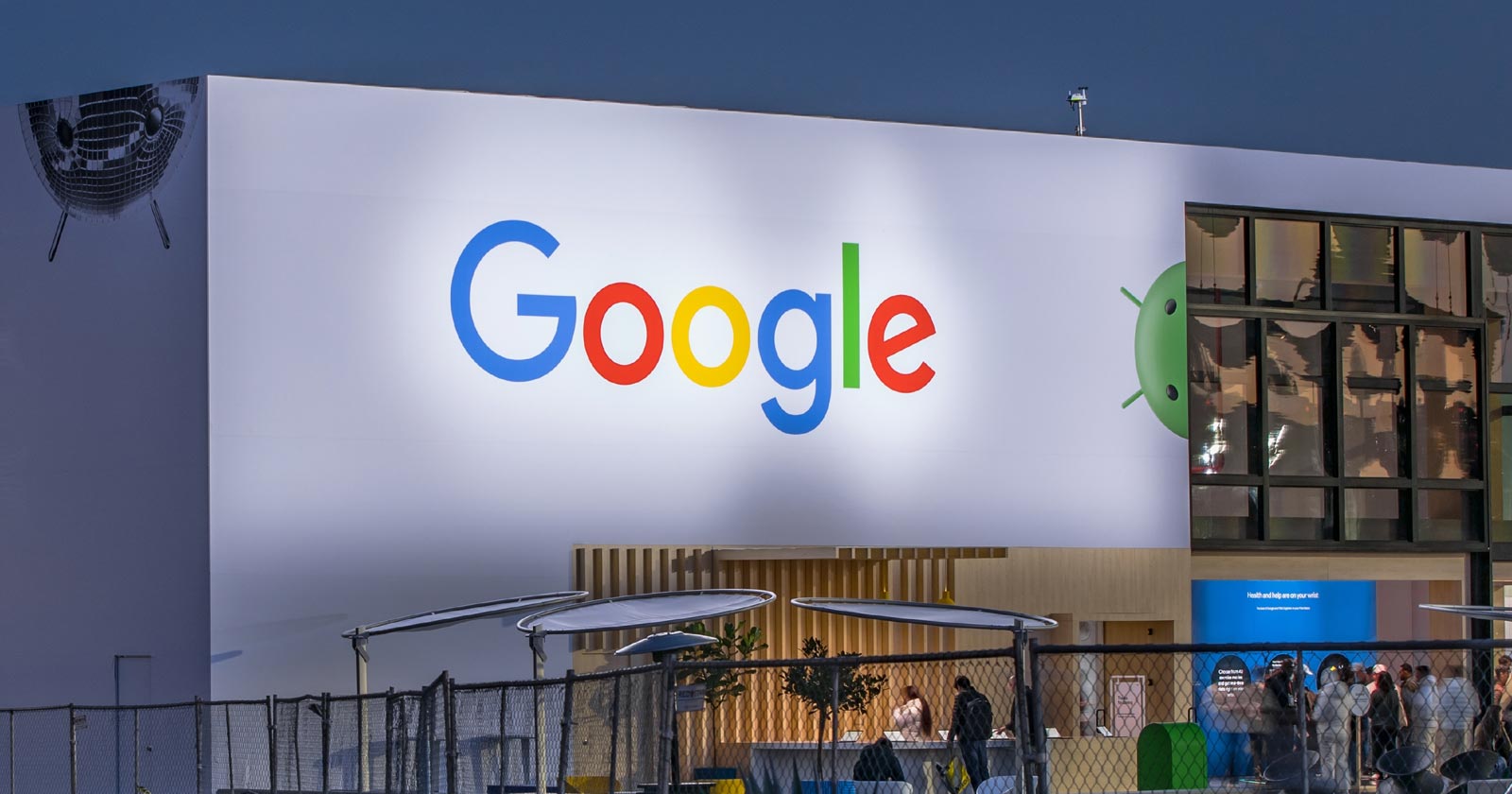
Google’s Gary Illyes confirmed at a recent search marketing conference that Google needs very few links, adding to the growing body of evidence that publishers need to focus on other factors. Gary tweeted confirmation that he indeed say those words.
Background Of Links For Ranking
Links were discovered in the late 1990’s to be a good signal for search engines to use for validating how authoritative a website is and then Google discovered soon after that anchor text could be used to provide semantic signals about what a webpage was about.
One of the most important research papers was Authoritative Sources in a Hyperlinked Environment by Jon M. Kleinberg, published around 1998 (link to research paper at the end of the article). The main discovery of this research paper is that there is too many web pages and there was no objective way to filter search results for quality in order to rank web pages for a subjective idea of relevance.
The author of the research paper discovered that links could be used as an objective filter for authoritativeness.
Kleinberg wrote:
“To provide effective search methods under these conditions, one needs a way to filter, from among a huge collection of relevant pages, a small set of the most “authoritative” or ‘definitive’ ones.”
This is the most influential research paper on links because it kick-started more research on ways to use links beyond as an authority metric but as a subjective metric for relevance.
Objective is something factual. Subjective is something that’s closer to an opinion. The founders of Google discovered how to use the subjective opinions of the Internet as a relevance metric for what to rank in the search results.
What Larry Page and Sergey Brin discovered and shared in their research paper (The Anatomy of a Large-Scale Hypertextual Web Search Engine – link at end of this article) was that it was possible to harness the power of anchor text to determine the subjective opinion of relevance from actual humans. It was essentially crowdsourcing the opinions of millions of website expressed through the link structure between each webpage.
What Did Gary Illyes Say About Links In 2024?
At a recent search conference in Bulgaria, Google’s Gary Illyes made a comment about how Google doesn’t really need that many links and how Google has made links less important.
Patrick Stox tweeted about what he heard at the search conference:
” ‘We need very few links to rank pages… Over the years we’ve made links less important.’ @methode #serpconf2024″
Google’s Gary Illyes tweeted a confirmation of that statement:
“I shouldn’t have said that… I definitely shouldn’t have said that”
Why Links Matter Less
The initial state of anchor text when Google first used links for ranking purposes was absolutely non-spammy, which is why it was so useful. Hyperlinks were primarily used as a way to send traffic from one website to another website.
But by 2004 or 2005 Google was using statistical analysis to detect manipulated links, then around 2004 “powered-by” links in website footers stopped passing anchor text value, and by 2006 links close to the words “advertising” stopped passing link value, links from directories stopped passing ranking value and by 2012 Google deployed a massive link algorithm called Penguin that destroyed the rankings of likely millions of websites, many of which were using guest posting.
The link signal eventually became so bad that Google decided in 2019 to selectively use nofollow links for ranking purposes. Google’s Gary Illyes confirmed that the change to nofollow was made because of the link signal.
Google Explicitly Confirms That Links Matter Less
In 2023 Google’s Gary Illyes shared at a PubCon Austin that links were not even in the top 3 of ranking factors. Then in March 2024, coinciding with the March 2024 Core Algorithm Update, Google updated their spam policies documentation to downplay the importance of links for ranking purposes.
The documentation previously said:
“Google uses links as an important factor in determining the relevancy of web pages.”
The update to the documentation that mentioned links was updated to remove the word important.
Links are not just listed as just another factor:
“Google uses links as a factor in determining the relevancy of web pages.”
At the beginning of April Google’s John Mueller advised that there are more useful SEO activities to engage on than links.
Mueller explained:
“There are more important things for websites nowadays, and over-focusing on links will often result in you wasting your time doing things that don’t make your website better overall”
Finally, Gary Illyes explicitly said that Google needs very few links to rank webpages and confirmed it.
I shouldn’t have said that… I definitely shouldn’t have said that
— Gary 鯨理/경리 Illyes (so official, trust me) (@methode) April 19, 2024
Why Google Doesn’t Need Links
The reason why Google doesn’t need many links is likely because of the extent of AI and natural language undertanding that Google uses in their algorithms. Google must be highly confident in its algorithm to be able to explicitly say that they don’t need it.
Way back when Google implemented the nofollow into the algorithm there were many link builders who sold comment spam links who continued to lie that comment spam still worked. As someone who started link building at the very beginning of modern SEO (I was the moderator of the link building forum at the #1 SEO forum of that time), I can say with confidence that links have stopped playing much of a role in rankings beginning several years ago, which is why I stopped about five or six years ago.
Read the research papers
Authoritative Sources in a Hyperlinked Environment – Jon M. Kleinberg (PDF)
The Anatomy of a Large-Scale Hypertextual Web Search Engine
Featured Image by Shutterstock/RYO Alexandre
SEO
How to Become an SEO Lead (10 Tips That Advanced My Career)
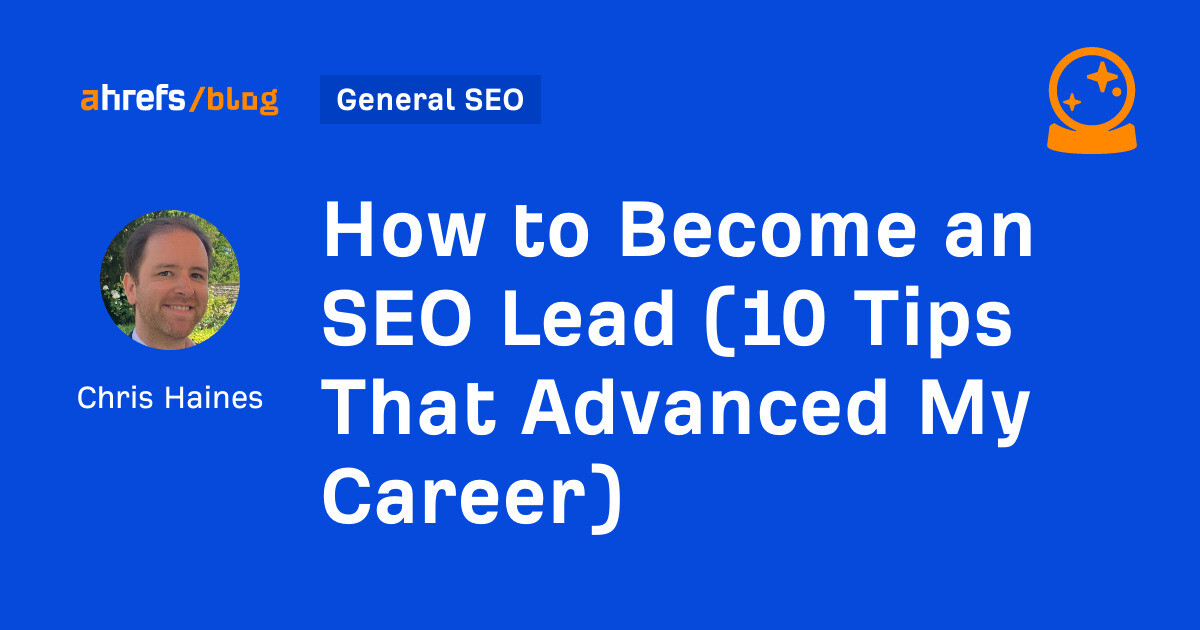
A few years ago, I was an SEO Lead managing enterprise clients’ SEO campaigns. It’s a senior role and takes a lot of work to get there. So how can you do it, too?
In this article, I’ll share ten tips to help you climb the next rung in the SEO career ladder.
Helping new hires in the SEO team is important if you want to become an SEO Lead. It gives you the experience to develop your leadership skills, and you can also share your knowledge and help others learn and grow.
It demonstrates you can explain things well, provide helpful feedback, and improve the team’s standard of work. It shows you care about the team’s success, which is essential for leaders. Bosses look for someone who can do their work well and help everyone improve.
Here are some practical examples of things I did early in my career to help mentor junior members of the team that you can try as well:
- Hold “lunch and learn” sessions on topics related to SEO and share case studies of work you have done
- Create process documents for the junior members of the team to show them how to complete specific tasks related to your work
- Compile lists of your favorite tools and resources for junior members of the team
- Create onboarding documents for interns joining the company
Wouldn’t it be great if you could look at every single SEO Lead’s resume? Well, you already can. You can infer ~70% of any SEO’s resume by spying on their LinkedIn and social media channels.
Type “SEO Lead” into LinkedIn and see what you get.
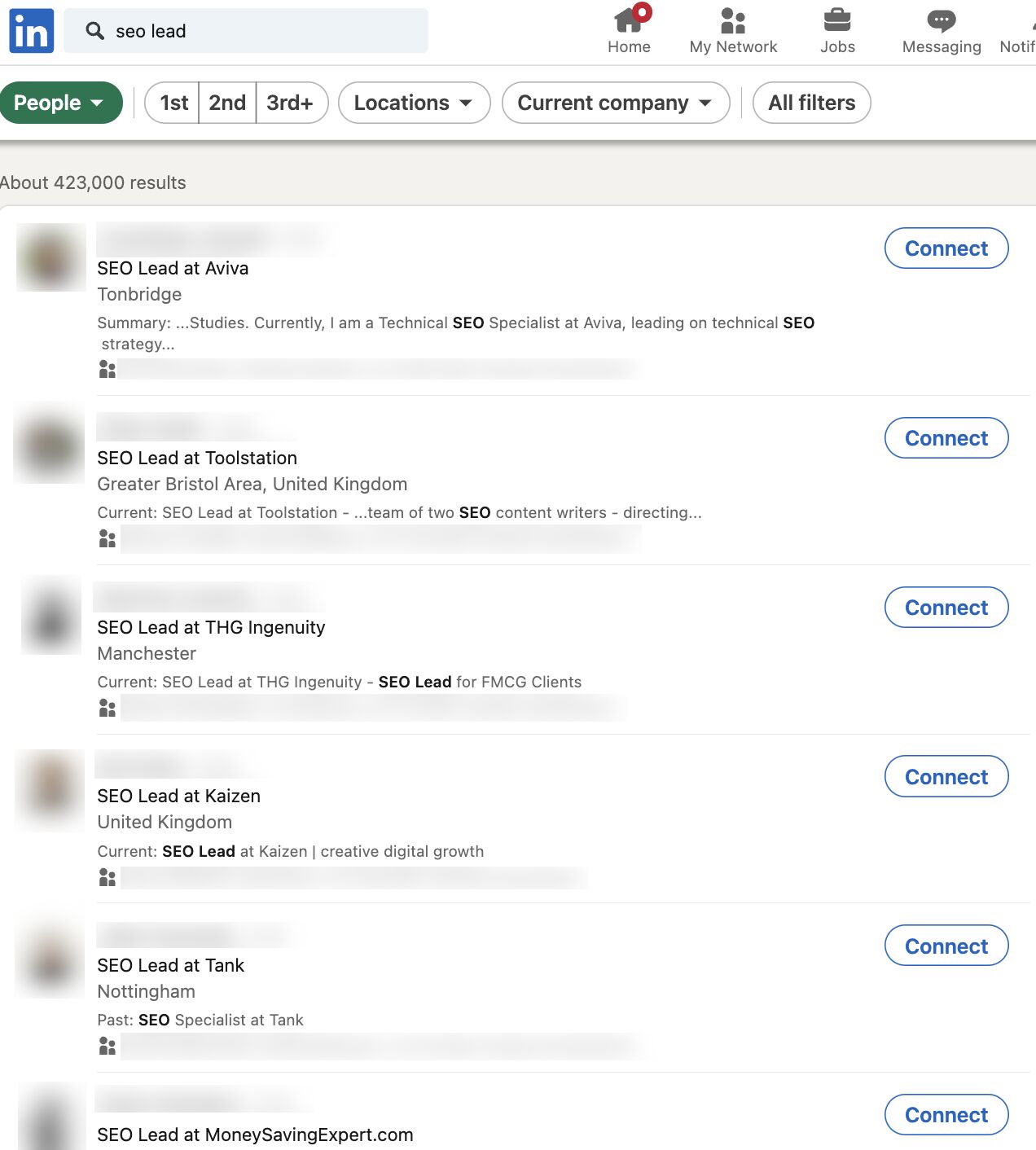
Tip
Look for common career patterns of the SEOs you admire in the industry.
I used this method to understand how my favorite SEOs and people at my company navigated their way from a junior role to a senior role.
For example, when the Head of SEO at the time Kirsty Hulse, joined my team, I added her on LinkedIn and realized that if I wanted to follow in her footsteps, I’d need to start by getting the role of SEO Manager to stand any possible chance of leading SEO campaigns like she was.
The progression in my company was from SEO Executive to Senior SEO Executive (Junior roles in London, UK), but as an outsider coming into the company, Kirsty showed me that it was possible to jump straight to SEO Manager given the right circumstances.
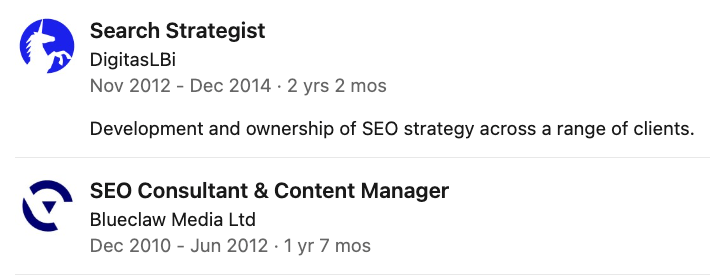

Using Kirsty’s and other SEOs’ profiles, I decided that the next step in my career needed to be SEO Manager, and at some point, I needed to get some experience with a bigger media agency so I could work my way up to leading an SEO campaign with bigger brands.
Sadly, you can’t just rock up to a monthly meeting and start leading a big brand SEO campaign. You’ll need to prove yourself to your line manager first. So how can you do this?
Here’s what I’d suggest you do:
- Create a strong track record with smaller companies.
- Obsessively share your wins with your company, so that senior management will already know you can deliver.
- At your performance review, tell your line manager that you want to work on bigger campaigns and take on more responsibility.
If there’s no hope of working with a big brand at your current job, you might need to consider looking for a new job where there is a recognizable brand. This was what I realized I needed to do if I wanted to get more experience.
Tip
Get recruiters on LinkedIn to give you the inside scoop on which brands or agencies are hiring. Ask them if you have any skill gaps on your resume that could prevent you from getting a job with these companies.
Being critical of your skill gaps can be hard to do. I found the best way to identify them early in my career was to ask other people—specifically recruiters. They had knowledge of the industry and were usually fairly honest as to what I needed to improve.
From this, I realized I lacked experience working with other teams—like PR, social, and development teams. As a junior SEO, your mind is focused 99% on doing SEO, but when you become more senior, your integration with other teams is important to your success.
For this reason, I’d suggest that aspiring SEO Leads should have a good working knowledge of how other teams outside of SEO operate. If you take the time to do this, it will pay dividends later in your career:
- If there are other teams in your company, ask if you can do some onboarding training with them.
- Get to know other team leads within your company and learn how they work.
- Take training courses to learn the fundamentals of other disciplines that complement SEO, such as Python, SQL, or content creation.
Sometimes, employers use skill gaps to pay you less, so it’s crucial to get the skills you need early on…
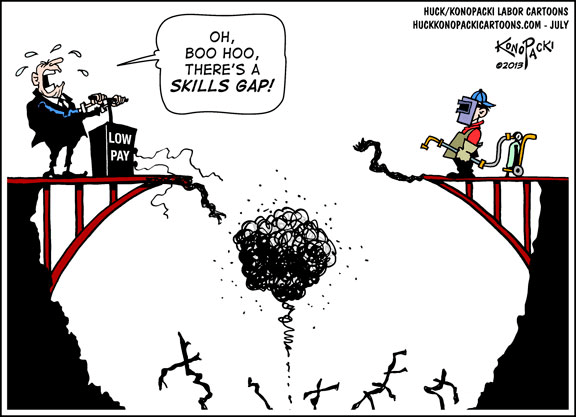

Examples of other skill gaps I’ve noticed include:
Tip
If you think you have a lot of skill gaps, then you can brush up your skills with our SEO academy. Once you’ve completed that, you can fast-track your knowledge by taking a course like Tom Critchlow’s SEO MBA, or you can try to develop these skills through your job.
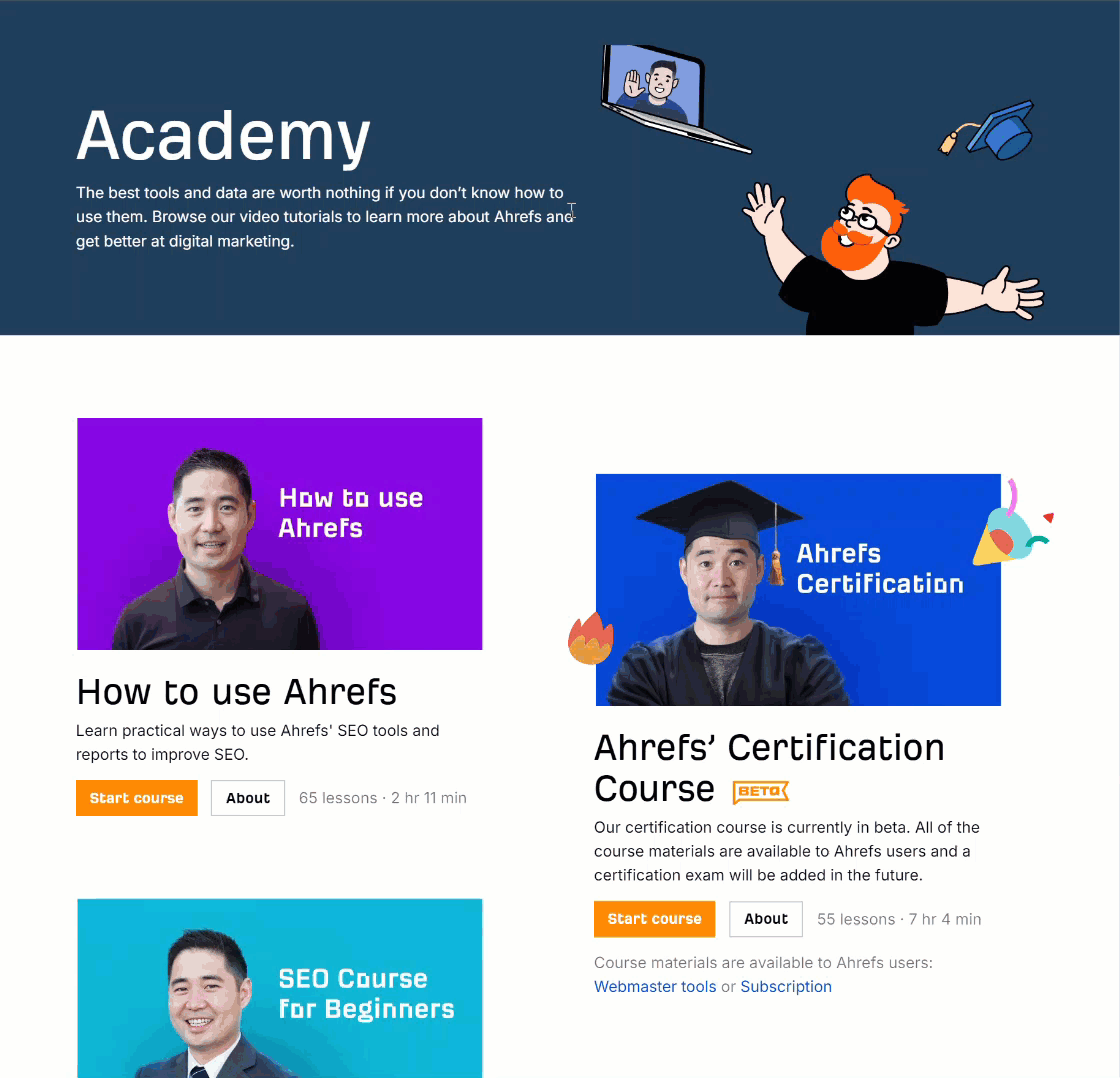

As a junior in any company, it can be hard to get your voice heard amongst the senior crowd. Ten years ago, I shared my wins with the team in a weekly group email in the office.
Here’s what you should be sharing:
- Praise from 3rd parties, e.g. “the client said they are impressed with the work this month.”
- Successful performance insights, e.g “following our SEO change, the client has seen X% more conversions this month.”
- Examples of the work you led, e.g. if your leadership and decision-making led to good results, then you need to share it.
At Ahrefs I keep a “wins” document. It’s just a simple spreadsheet that lists feedback on the blog posts I’ve written, the links I’ve earned and what newsletters my post was included in. It’s useful to have a document like this so you have a record of your achievements.
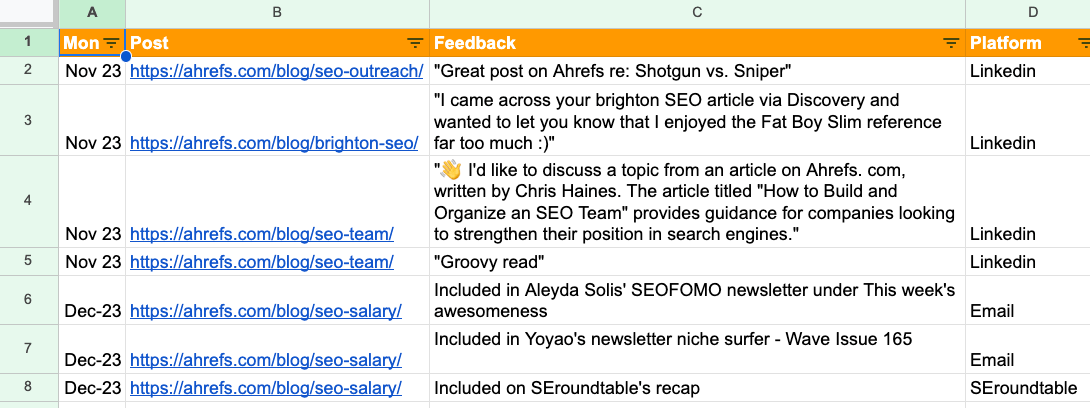

Sidenote.
Junior SEOs sometimes talk about the things “we” achieved as a team rather than what they achieved at the interview stage. If you want the SEO Lead role, remember to talk about what you achieved. While there’s no “I” in team, you also need to advocate for yourself.
One of my first big wins as an SEO was getting a link from an outreach campaign on Buzzfeed. When I went to Brighton SEO later that year and saw Matthew Howells-Barby sharing how he got a Buzzfeed link, I realized that this was not something everyone had done.
So when I did manage to become an SEO Lead, and my team won a prize in Publicis Groupe for our SEO performance, I made sure everyone knew about the work we did. I even wrote a case study on the work for Publicis Groupe’s intranet.
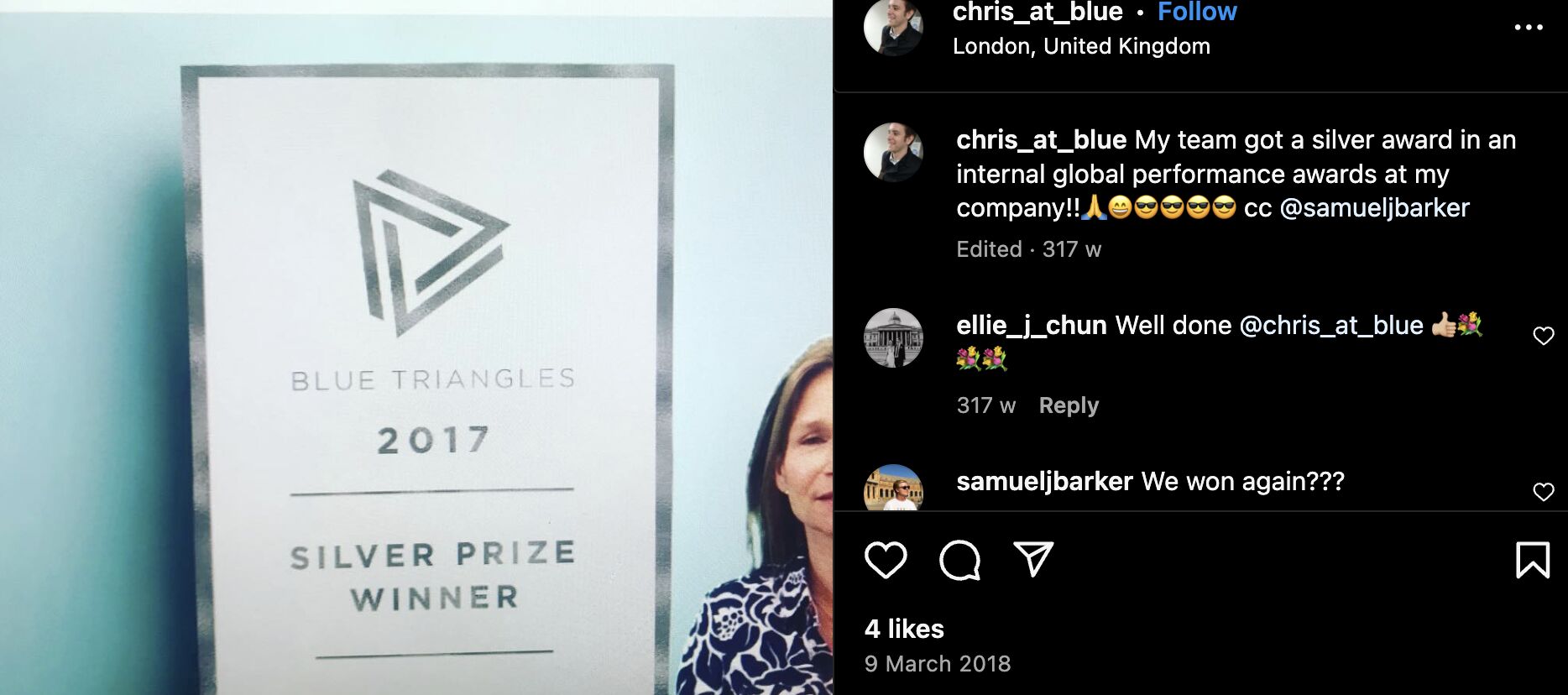

I’ve worked with some incredibly talented people, many of whom have helped me in my career.
I owe my big break to Tim Cripps, Laura Scott, and Kevin Mclaren. Without their support and encouragement, I wouldn’t be where I am today. Even before that, David Schulhof, Jodie Wheeler, and Carl Brooks let me mastermind some bonkers content campaigns that were lucky enough to succeed:


I wasn’t even an SEO Lead at that point, but they gave me the reins and trusted me.
So, how can you find your tribe?
- Speak to recruiters – they might hold the ticket to your next dream job. I spoke to many recruiters early in my career, but only two recruiters delivered for me—they were Natasha Woodford, and Amalia Gouta. Natasha helped me get a job that filled my skill gap, and Amalia helped me get my first SEO Lead role.
- Go to events and SEO conferences, and talk to speakers to build connections outside of your company.
- Use LinkedIn and other social media to interact with other companies or individuals that resonate with you.
Many senior SEO professionals spend most of their online lives on X and LinkedIn. If you’re not using them, you’re missing out on juicy opportunities.
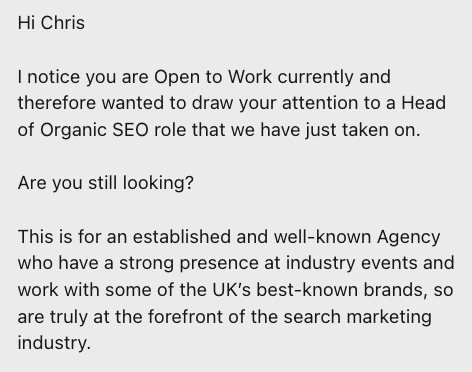

Sharing your expertise on these platforms is one of the easiest ways to increase your chances of getting a senior SEO role. Because, believe it or not, sometimes a job offer can be just a DM away.
Here’s some specific ideas of what you can share:
- Share your thoughts on a trending topic – like the latest Google algorithm update.
- Share what you learned during the course of a campaign.
- Ask the community for their thoughts on a certain topic.
I’ve recently started posting on LinkedIn and am impressed by the reach you can get by posting infrequently on these topics.
Here’s an example of one of my posts where I asked the community for help researching an article I was writing:
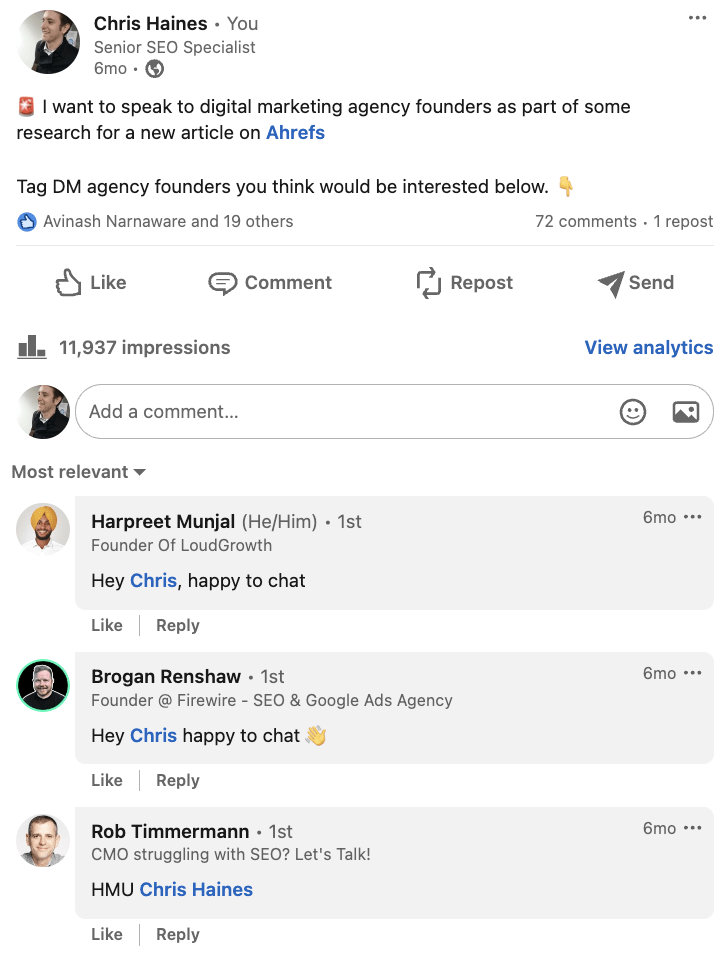

And here is the content performance across the last year from posting these updates.
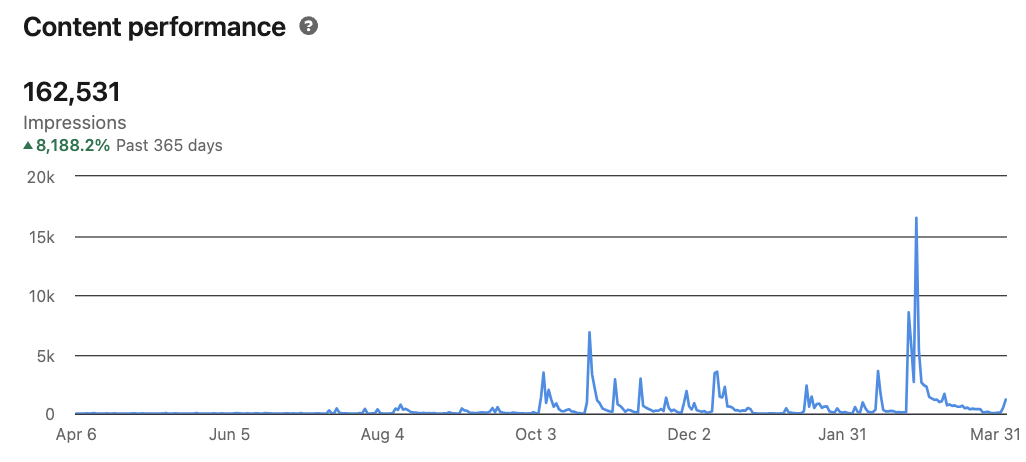

I’m clearly not a LinkedIn expert—far from it! But as you can see, with just a few months of posting, you can start to make these platforms work for you.
Godard Abel, co-founder of G2, talked on a podcast about conscious leadership. This struck a chord with me recently as I realized that I had practiced some of the principles of conscious leadership—unconsciously.
You can start practicing conscious leadership by asking yourself if your actions are above or below the line. Here are a few examples of above and below-the-line thinking:
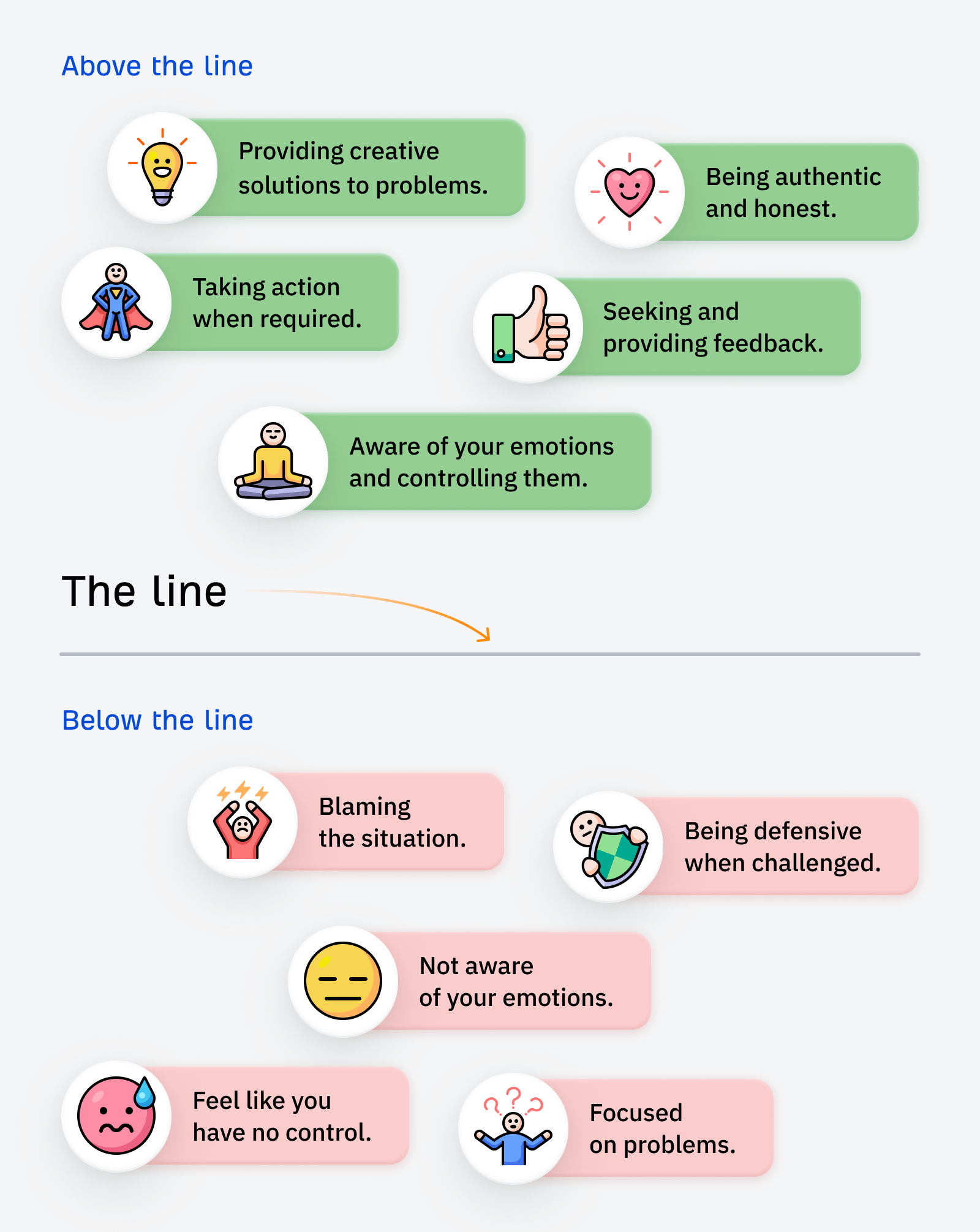

If you want a senior SEO role, I’d suggest shifting your mindset to above-the-line thinking.
In the world of SEO, it’s easy to blame all your search engine woes on Google. We’ve all been there. But a lot of the time, simple changes to your website can make a huge difference—it just takes a bit of effort to find them and make the changes.
SEO is not an exact science. Some stakeholders naturally get nervous if they sense you aren’t sure about what you’re saying. If you don’t get their support early on then you fall at the first hurdle.
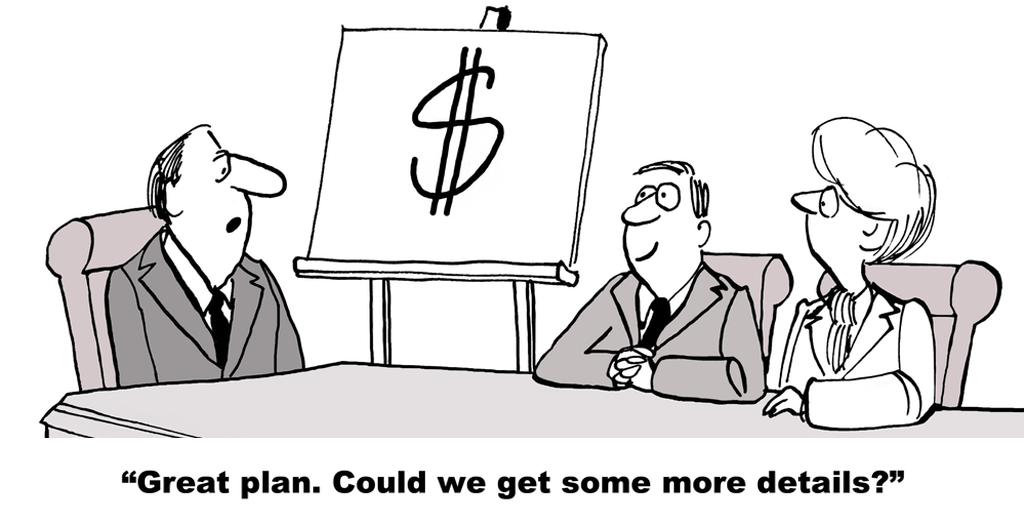

To become more persuasive, try incorporating Aristotle’s three persuasive techniques into your conversations.
- Pathos: use logical reasoning, facts, and data to present water-tight arguments.
- Ethos: establish your credibility and ethics through results.
- Logos: make your reports tell a story.
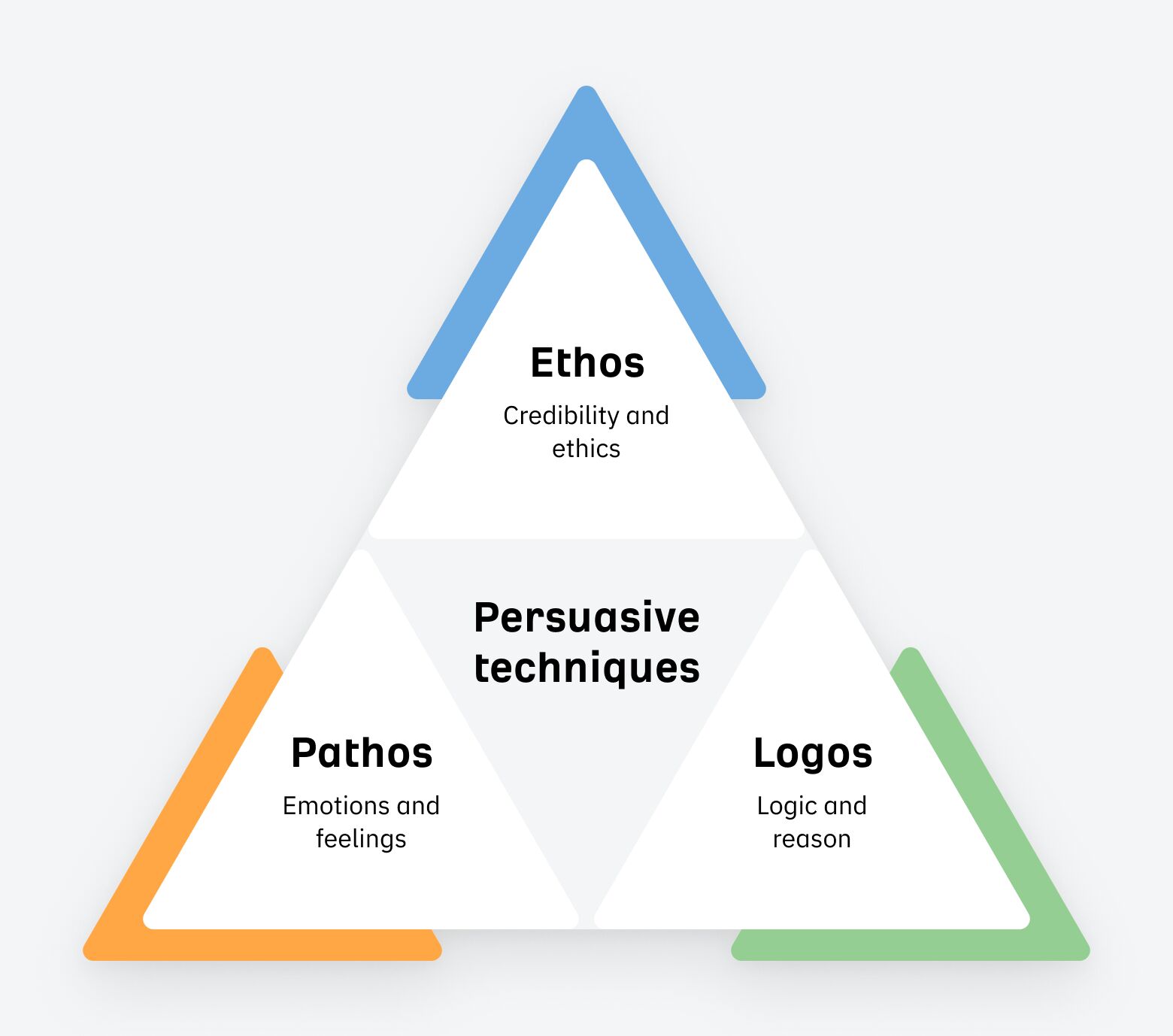

Then sprinkle in language that has a high level of modality:
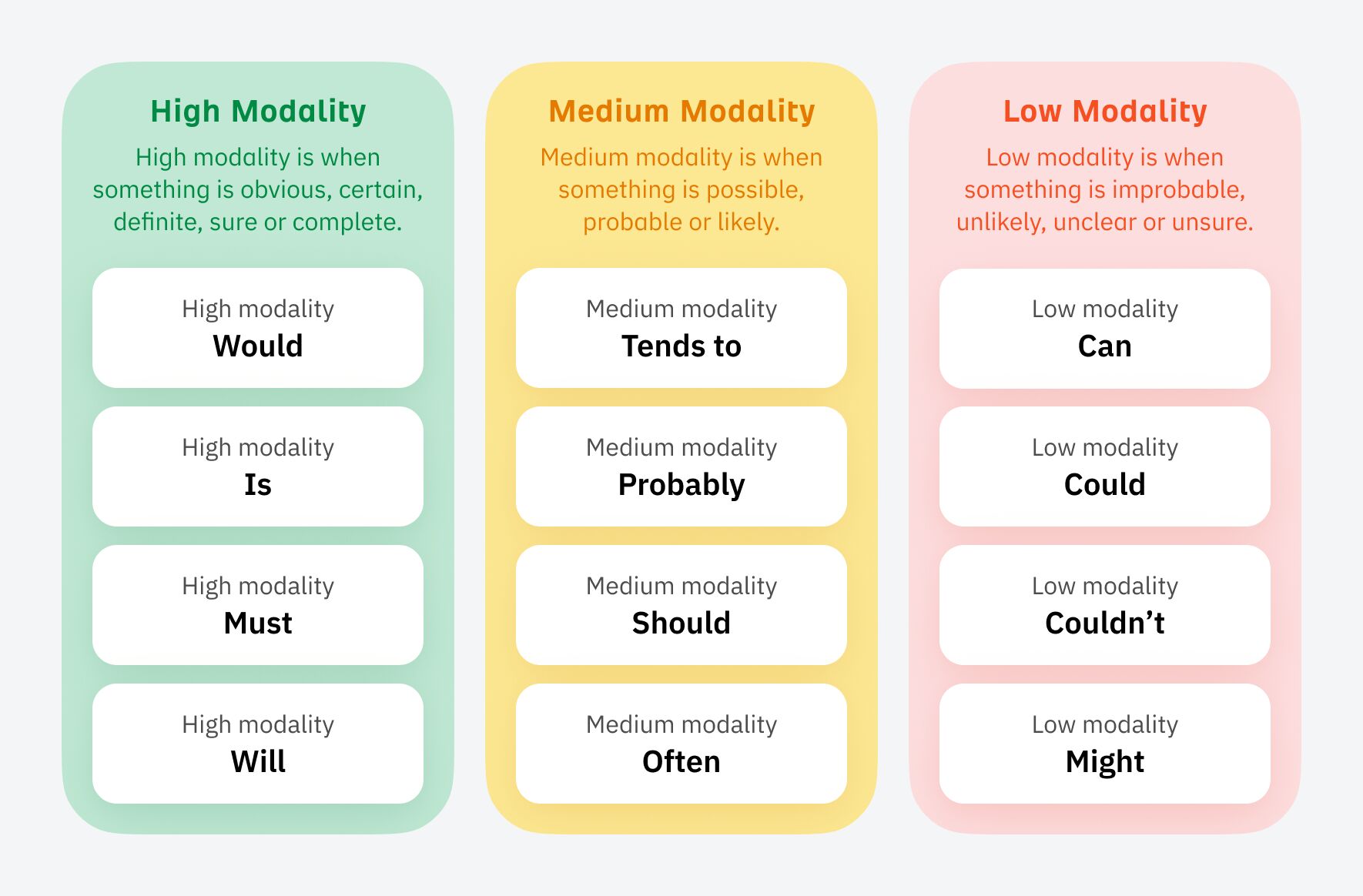

Some people will be able to do this naturally without even realizing it, but for others, it can be an uphill struggle. It wasn’t easy for me, and I had to learn to adapt the way I talked to stakeholders early on.
The strongest way I found was to appeal to emotions and back up with data from a platform like Ahrefs. Highlight what competitors have done in terms of SEO and the results they’ve earned from doing it.
Sidenote.
You don’t have to follow this tip to the letter, but being aware of these concepts means you’ll start to present more confident and persuasive arguments for justifying your SEO strategies.
When I started in SEO, I had zero connections. Getting a job felt like an impossible challenge.
Once I’d got my first SEO Lead job, it felt stupidly easy to get another one—just through connections I’d made along the way in my SEO journey.
I once got stuck on a delayed train with a senior member of staff, and he told me he was really into Google Local Guides, and he was on a certain high level. He said it took him a few years to get there.
Local Guides is part of Google Maps that allows you submit reviews and other user generated content
When he showed me the app, I realized that you could easily game the levels by uploading lots of photos.
In a “hold my beer” moment, I mass downloaded a bunch of photos, uploaded them to Local Guides and equaled his Local Guide level on the train in about half an hour. He was seething.
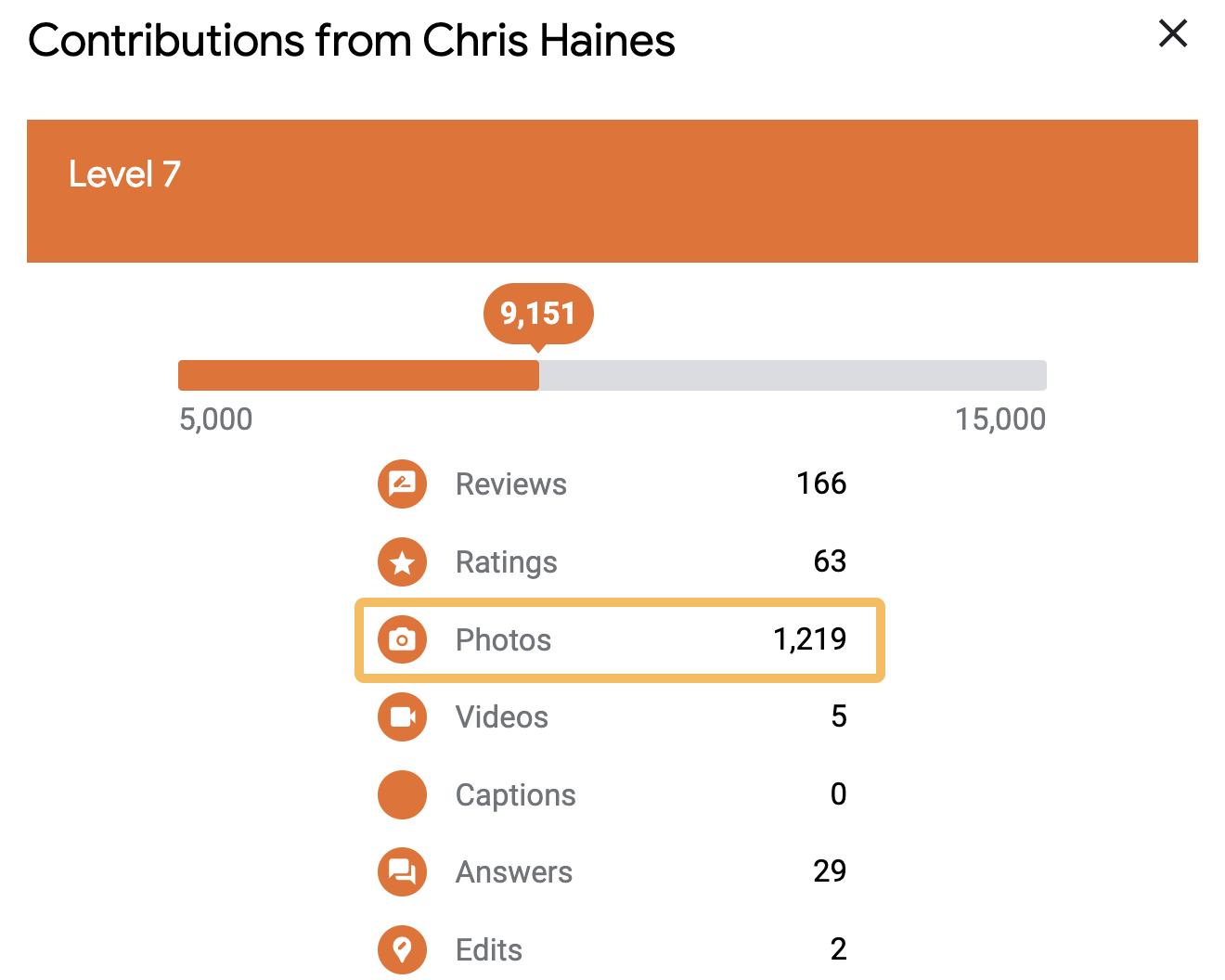

One of the photos I uploaded was a half-eaten Subway. It still amazes me that 50,974 people have seen this photo:
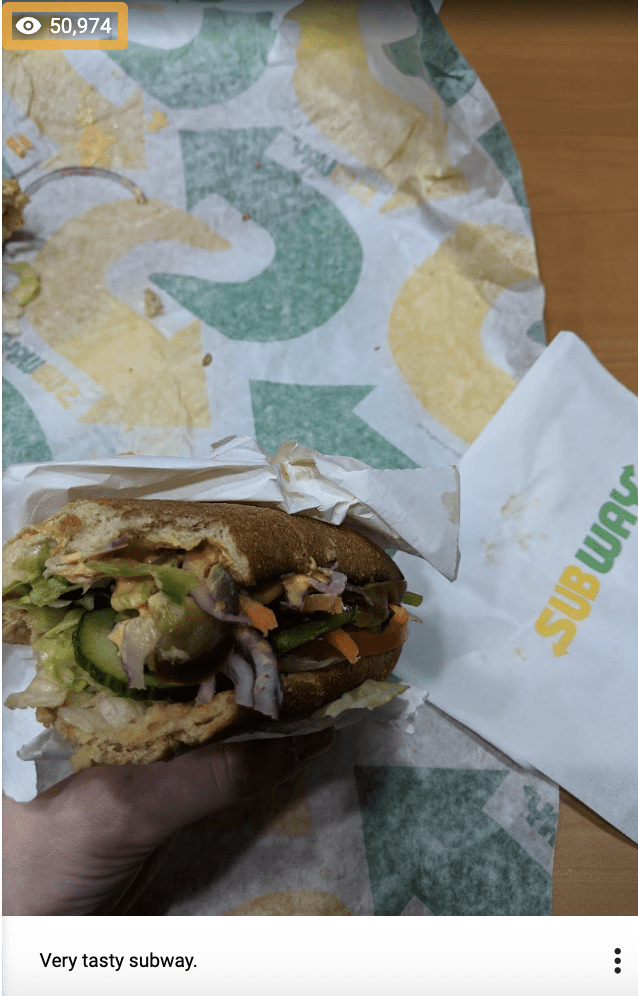

This wasn’t exactly SEO, but the ability to find this ‘hack’ so quickly impressed him, and we struck up a friendship.
The next month that person moved to another company, and then another few months later, he offered me an SEO Lead job.
Tip
Build connections with everyone you can—you never know who you might need to call on next.
Final thoughts
The road to becoming an SEO Lead seems straightforward enough when you start out, but it can quickly become long and winding.
But now armed with my tips, and a bucket load of determination, you should be able to navigate your way to an SEO Lead role much quicker than you think.
Lastly, if you want any more guidance, you can always ping me on LinkedIn. 🙂
SEO
7 Content Marketing Conferences to Attend in 2024
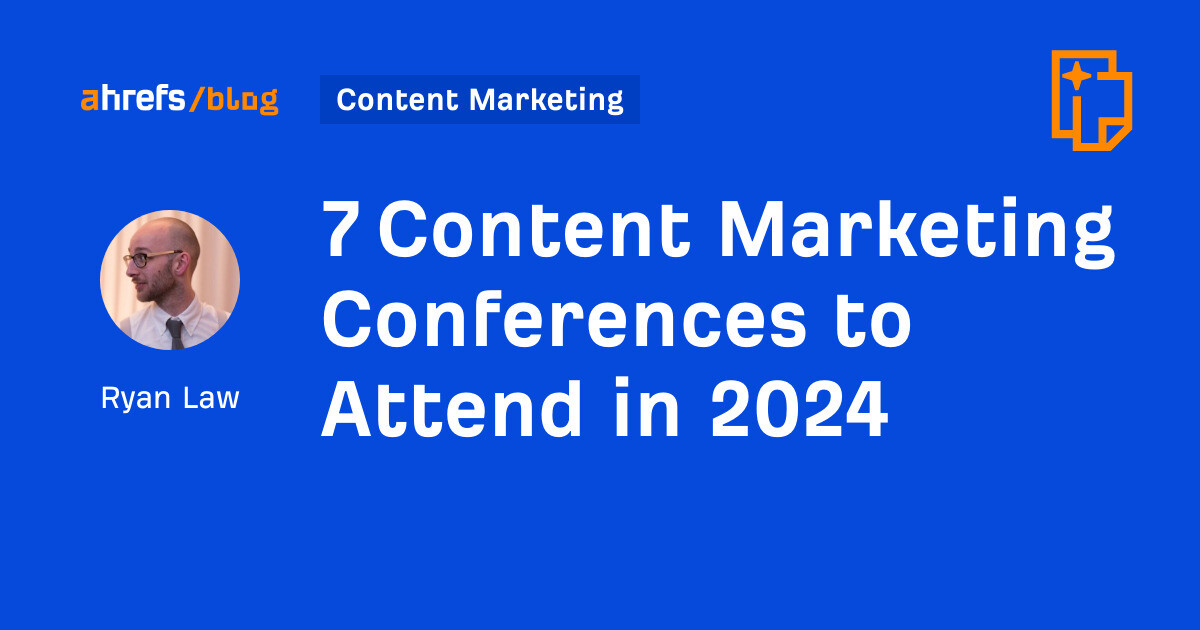
I spend most of my days sitting in front of a screen, buried in a Google Doc. (You probably do too.)
And while I enjoy deep work, a few times a year I get the urge to leave my desk and go socialize with other human beings—ideally on my employer’s dime 😉
Conferences are a great excuse to hang out with other content marketers, talk shop, learn some new tricks, and pretend that we’re all really excited about generative AI.
Without further ado, here are the biggest and best content marketing conferences happening throughout the rest of 2024.
Dates: May 5–7
Prices: from $795
Website: https://cex.events/
Location: Cleveland, OH
Speakers: B.J. Novak, Ann Handley, Alexis Grant, Justin Welsh, Mike King
CEX is designed with content entrepreneurs in mind (“contenpreneurs”? Did I just coin an awesome new word?)—people that care as much about the business of content as they do the craft.
In addition to veteran content marketers like Ann Handley and Joe Pulizi waxing lyrical about modern content strategy, you’ll find people like Justin Welsh and Alexis Grant exploring the practicalities of quitting your job and becoming a full-time content creator.
Here’s a trailer for last year’s event:
Sessions include titles like:
- Unlocking the Power of Book Publishing: From Content to Revenue
- Quitting A $200k Corporate Job to Become A Solo Content Entrepreneur
- Why You Should Prioritize Long-Form Content
(And yes—Ryan from The Office is giving the keynote.)
Dates: Jun 3–4
Location: Seattle, WA
Speakers: Wil Reyolds, Bernard Huang, Britney Muller, Lily Ray
Prices: from $1,699
Website: https://moz.com/mozcon
Software company Moz is best known in the SEO industry, but its conference is popular with marketers of all stripes. Amidst a lineup of 25 speakers there are plenty of content marketers speaking, like Andy Crestodina, Ross Simmonds, and Chima Mmeje.
Check out this teaser from last year’s event:
This year’s talks include topics like:
- Trust and Quality in the New Era of Content Discovery
- The Power of Emotion: How To Create Content That (Actually) Converts
- “E” for Engaging: Why The Future of SEO Content Needs To Be Engaging
Dates: Sep 18–20
Location: Boston, MA
Speakers: TBC
Prices: from $1,199
Website: https://www.inbound.com/
Hosted by content marketing OG HubSpot, INBOUND offers hundreds of talks, deep dives, fireside chats, and meetups on topics ranging from brand strategy to AI.
Here’s the recap video:
I’ve attended my fair share of INBOUNDs over the years (and even had a beer with co-founder Dharmesh Shah), and always enjoy the sheer choice of events on offer.
Keynotes are a highlight, and this year’s headline speaker has a tough act to follow: Barack Obama closed out the conference last year.
Dates: Oct 22–23
Location: San Diego, CA
Speakers: TBC
Prices: from $1,199
Website: https://www.contentmarketingworld.com/
Arguably the content marketing conference, Content Marketing World has been pumping out content talks and inspiration for fourteen years solid.
Here’s last year’s recap:
The 2024 agenda is in the works, but last year’s conference explored every conceivable aspect of content marketing, from B2C brand building through to the quirks of content for government organizations, with session titles like:
- Government Masterclass: A Content Marketing Strategy to Build Public Trust
- A Beloved Brand: Evolving Zillow’s Creative Content Strategy
- Evidence-Based SEO Strategies: Busting “SEO Best Practices” and Other Marketing Myths
Dates: Oct 24–25
Location: Singapore
Speakers: Andy Chadwick, Nik Ranger, Charlotte Ang, Marcus Ho, Victor Karpenko, Amanda King, James Norquay, Sam Oh, Patrick Stox, Tim Soulo (and me!)
Prices: TBC
Website: https://ahrefs.com/events/evolve2024-singapore
That’s right—Ahrefs is hosting a conference! Join 500 digital marketers for a 2-day gathering in Singapore.
We have 20 top speakers from around the world, expert-led workshops on everything from technical SEO to content strategy, and tons of opportunities to rub shoulders with content pros, big brands, and the entire Ahrefs crew.
I visited Singapore for the first time last year and it is really worth the trip—I recommend visiting the Supertree Grove, eating at the hawker markets in Chinatown, and hitting the beach at Sentosa.
If you need persuading, here’s SEO pro JH Scherck on the Ahrefs podcast making the case for conference travel:
And to top things off, here’s a quick walkthrough of the conference venue:
Dates: Oct 27–30
Location: Portland, OR
Speakers: Relly Annett-Baker, Fawn Damitio, Scott Abel, Jennifer Lee
Prices: from $1,850
Website: https://lavacon.org/
LavaCon is a content conference with a very technical focus, with over 70 sessions dedicated to helping companies solve “content-related business problems, increase revenue, and decrease production costs”.
In practice, that means speakers from NIKE, Google, Meta, Cisco, and Verizon, and topics like:
- Operationalizing Generative AI,
- Taxonomies in the Age of AI: Are they still Relevant?, and
- Out of Many, One: Building a Semantic Layer to Tear Down Silos
Here’s the recap video for last year’s conference:
Dates: Nov 8
Location: London
Speakers: Nick Parker, Tasmin Lofthouse, Dan Nelken, Taja Myer
Prices: from £454.80
Website: https://www.copywritingconference.com/
CopyCon is a single-day conference in London, hosted by ProCopywriters (a membership community for copywriters—I was a member once, many years ago).
Intended for copywriters, creatives, and content strategists, the agenda focuses heavily on the qualitative aspects of content that often go overlooked—creative processes, tone of voice, and creating emotional connections through copy.
It’s a few years old, but this teaser video shares a sense of the topics on offer:
This year’s talks include sessions like:
- The Mind-Blowing Magic of Tone of Voice,
- The Power of AI Tools as a Content Designer, and the beautifully titled
- Your Inner Critic is a Ding-Dong.
(Because yes, your inner critic really is a ding-dong.)
Final thoughts
These are all content-specific conferences, but there are a ton of content-adjacent events happening throughout the year. Honourable mentions go to DigiMarCon UK 2024 (Aug 29–30, London, UK), Web Summit (Nov 11–14, Lisbon, Portugal), and B2B Forum (Nov 12–14, Boston, MA).
I’ve focused this list solely on in-person events, but there are also online-only conferences available, like ContentTECH Summit (May 15–16).
Heading to a content conference that I haven’t covered? Share your recommendation with me on LinkedIn or X.
-

 PPC4 days ago
PPC4 days ago19 Best SEO Tools in 2024 (For Every Use Case)
-

 PPC7 days ago
PPC7 days ago4 New Google Ads Performance Max Updates: What You Need to Know
-
SEARCHENGINES6 days ago
Daily Search Forum Recap: April 16, 2024
-

 MARKETING6 days ago
MARKETING6 days agoWill Google Buy HubSpot? | Content Marketing Institute
-

 SEO6 days ago
SEO6 days agoGoogle Clarifies Vacation Rental Structured Data
-
SEARCHENGINES5 days ago
Daily Search Forum Recap: April 17, 2024
-

 MARKETING6 days ago
MARKETING6 days agoStreamlining Processes for Increased Efficiency and Results
-

 PPC7 days ago
PPC7 days agoHow to Collect & Use Customer Data the Right (& Ethical) Way










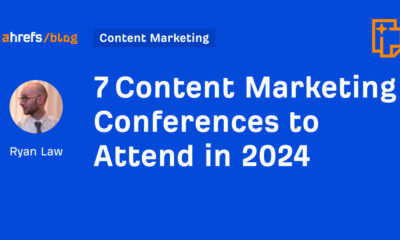





You must be logged in to post a comment Login